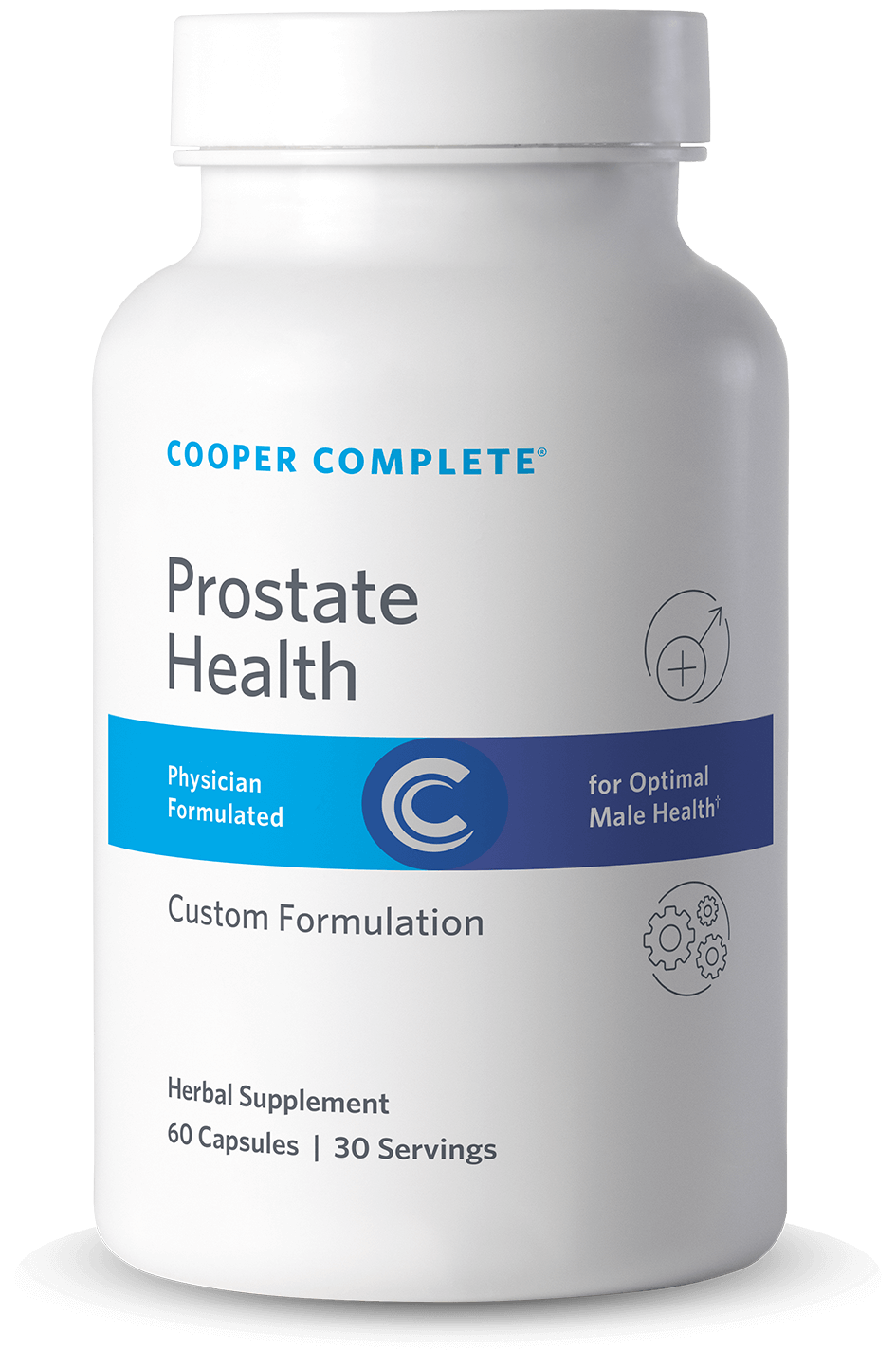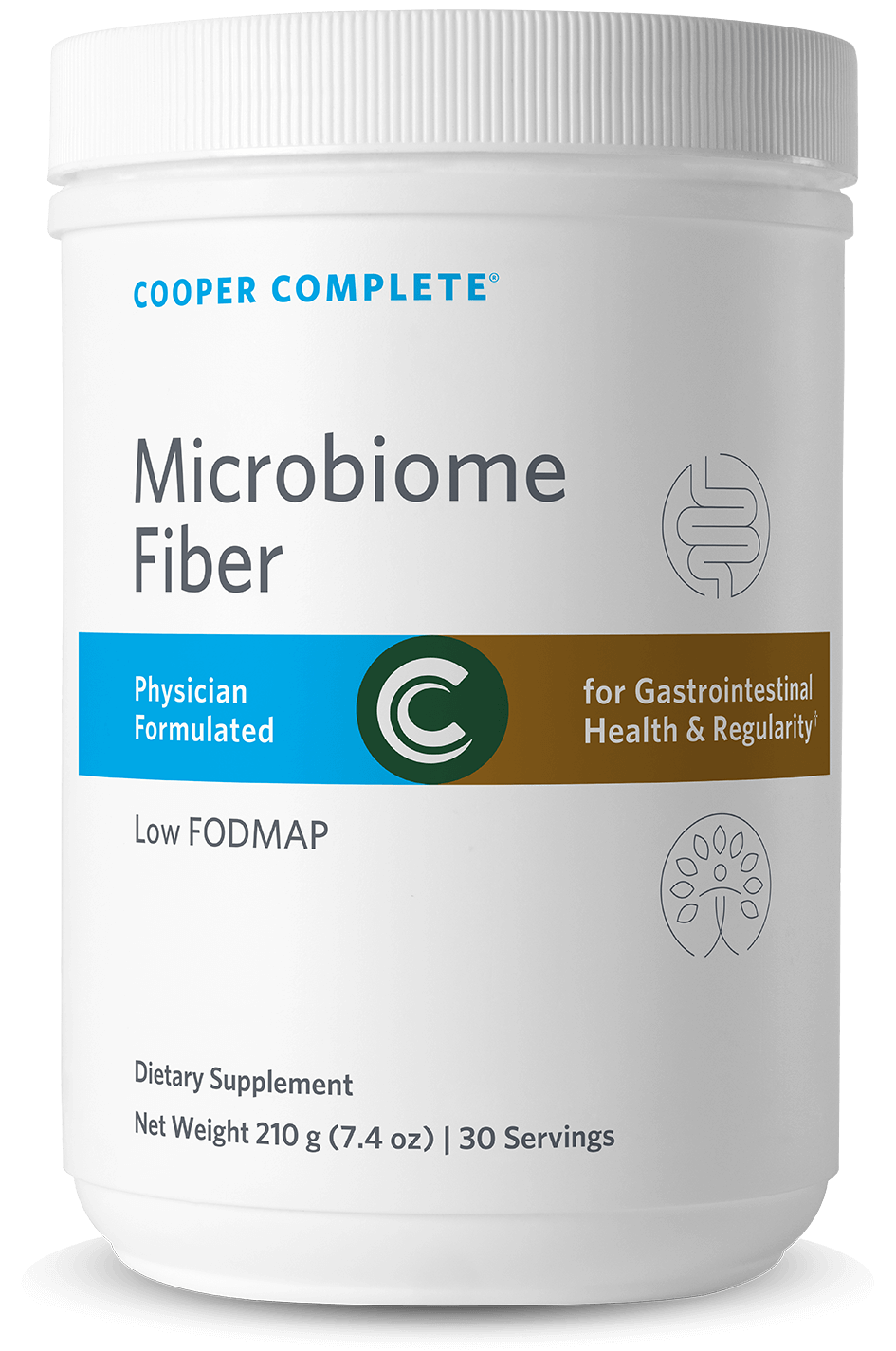Best Supplements for Prostate Health

Prostate cancer is the second most common form of cancer among American men, with around 1 in 8 being diagnosed at some point in their lifetime. The American Cancer Society estimates approximately 288,300 new cases will be diagnosed in 2023 with approximately 34,700 fatalities. The good news is, thanks to earlier detection and advances in treatment, the prostate cancer death rate declined by 50 percent between 1993 and 2013.
While relatively rare in men under 40, 6 cases out of 10 are diagnosed after the age of 65. As men age, the prostate slowly grows, and by age 60, more than half of all men have symptoms of an enlarged prostate. By age 80, more than 90 percent of men have signs of BPH (benign prostatic hyperplasia)—an enlargement of the prostate common in older men.
In most cases, prostate cancer symptoms are not detectable or obvious in the early stages of the disease and may present differently from one individual to the next. It is important to note, however, that some of the early signs may simply be a symptom of BPH and are unrelated to cancer.
Due to its close proximity to the bladder and urethra, cancer of the prostate gland may be accompanied by a variety of urinary issues, especially in the early stages. Depending on its size and location, a tumor may press on and constrict the urethra, inhibiting the flow of urine.
Potential Early Signs of Prostate Cancer
- Burning or pain while urinating
- Difficulty urinating—trouble starting and stopping
- Frequent urges to urinate at night
- Loss of bladder control
- Decreased flow or velocity of the urine stream
- Blood in the urine (hematuria)
- Blood in semen
- Erectile dysfunction
- Painful ejaculation
In an advanced stage, prostate cancer may spread or metastasize, forming tumors in nearby organs or bones. If it reaches the spine, tumors may press on the spinal nerves. Signs of metastatic prostate cancer may include:
- Swelling in the legs or pelvic area
- Numbness or pain in the hips, legs or feet
- Consistent bone pain or fractures
Screening Recommendations for Prostate Health
A prostate exam enables your doctor to diagnose an enlarged or inflamed prostate gland and prostate cancer. Two initial tests are commonly used in the detection of prostate cancer. The first of these is a blood analysis to identify the level of prostate-specific antigen (PSA)—a protein produced by cells of the prostate gland—in the blood, and the second is a digital rectal exam, with a final diagnosis then confirmed by a biopsy.
Cooper Clinic Platinum Physician Steven Lilly, MD, says, “Cooper Clinic offers and recommends screening for prostate cancer annually, starting at the age of 40.” This is especially important for men considered at high risk for prostate cancer, including:
- African-American men
- Men of Scandinavian descent
- Men with two or more family members with a history of prostate cancer
You should always consult your doctor or health care provider to determine when it is appropriate for you to be screened.
Support Prostate Health with Nutrition
Globally, prostate cancer is most common in North America. While the reason for this is not known, the Western lifestyle and diet are thought to be factors. Diets featuring large amounts of red meat, dairy products high in saturated fats like butter and cheese, fast foods and processed foods rich in trans fats may increase the risk of prostate cancer.
The American Cancer Society emphasizes a diet rich in plant-based foods for cancer prevention. The anti-inflammatory and antioxidant phytochemicals found in fruits and vegetables have been associated with a decreased risk of cancer development. Choose whole-grain options high in fiber—shown to help decrease the risk of developing many types of cancers—and maintain a balanced, Mediterranean-like diet, including:
Healthy Protein
- Fish
- Poultry
- Eggs
Healthy Fats
- Olive oil
- Avocados
- Nuts (almonds, walnuts, pecans)
Vegetables & Legumes
- Leafy green vegetables
- Beans
Simple Lifestyle Changes Support Prostate Health
In addition to eating the right foods, simple changes to the things we do every day can help support a healthy prostate. These include:
- Maintain a healthy weight
- Get regular exercise
- Hydrate—and urinate—frequently
- Avoid long periods of sitting
- Stop smoking and drink less alcohol
- Increase levels of vitamin D
- Manage stress
- Stay sexually active
Exercise to Reduce BPH
Exercise has numerous benefits for overall health. For example, in an ongoing study at Harvard, men who increased physical activity were less likely to suffer from BPH. Even activities such as walking regularly at a moderate pace yielded benefits.
In Italy, researchers conducted a randomized controlled trial on men with symptoms of an enlarged prostate. One group walked briskly three times a week. The second group did non-aerobic exercises of sit-ups, leg lifts and stretching. Overall, both groups reported improvement in symptoms, but the group who walked briskly had lower levels of pain, anxiety and depression.
Additionally, the ERASE trial showed a 12-week regimen of high-intensity interval training (HIIT) not only improved cardiovascular fitness among men with localized prostate cancer, it also decreased levels of prostate-specific antigen (PSA), PSA velocity and prostate cancer cell growth.
Supplementation for Prostate Health
It is crucial to not ignore any symptoms of BPH or prostate cancer, despite the discomfort of the topic. Prostate health becomes a more serious issue with age and it is important to get checked regularly by a physician. Take the preventive approach with prostate cancer screenings coupled with proper nutrition and supplementation.
Cooper Complete Prostate Health Supplement contains natural nutrients such as lycopene, saw palmetto and pygeum, all clinically proven to promote a healthy prostate. Many research studies have shown saw palmetto can markedly reduce symptoms of BPH, including frequent urination.
Lycopene for Naturally Protecting Prostate Health
Lycopene—found in cooked tomatoes, red grapefruit and watermelon—is a powerful antioxidant that works to protect prostate health. Several studies find that populations with higher dietary lycopene intake have lower rates of prostate cancer.
In a prospective study of 29,361 men with a family history of prostate cancer were followed for an average of 4.2 years. The risk of prostate cancer was reduced in men who consumed higher levels of tomato-based foods with higher levels of lycopene than those who did not. The United States Drug Administration Food Database lists the following foods containing lycopene:
| Food | Measure | Amount Per Serving |
| Tomato sauce (canned) | 1 cup | 34 mg |
| Spaghetti/marinara ready-to-serve pasta sauce | 1/2 cup | 17 mg |
| Canned tomato soup (prepared with water or milk) | 1 cup | 13 mg |
| Watermelon (raw) | 1 cup balls | 7 mg |
| Cherry tomatoes (fresh) | 1 cup | 4 mg |
| Grapefruit (red or pink) | 1 cup sections | 3 mg |
Lycopene—found in cooked tomatoes, red grapefruit and watermelon—is a powerful antioxidant that works to protect prostate health. Several studies find that populations with higher dietary lycopene intake have lower rates of prostate cancer.
Cooper Complete Prostate Health and Basic One Multivitamin contain 5 mg of lycopene while Original Multivitamin contains 10 mg of lycopene.

Prostate Supplement For Men
Physician formulated and recommended supplement with saw palmetto, pygeum, and lycopene recommended for men with benign prostate hyperplasia (BPH).†
$31.48 Add to cartSaw Palmetto Extract
Long used in Europe for the management of BPH symptoms, saw palmetto is a plant extract that works to protect against the irritating symptoms of an enlarged prostate. While saw palmetto does not shrink the overall size of the prostate, it seems to shrink the inner lining that puts pressure on the tubes that carry urine.
A clinical trial conducted in 2021 concluded that saw palmetto extract was a safe and effective nutrient for the treatment of chronic prostatitis—inflammation of the prostate gland—as did a meta-analysis of 27 studies using the fatty acid form of saw palmetto.
Men taking blood thinners such as Coumadin or Warfarin should not take Cooper Complete Prostate Health as saw palmetto may increase bleeding.
Cooper Complete Prostate Health contains 200 mg of saw palmetto extract (min. 85% fatty acids, serenoa repens).
Saw palmetto does not shrink the overall size of the prostate, but it seems to shrink the inner lining that puts pressure on the tubes that carry urine. Men taking blood thinners (such as Coumadin or Warfarin) should not take Cooper Complete Prostate Health as saw palmetto may increase bleeding.
Pygeum
Also a powerful antioxidant, pygeum is another plant extract that can improve urinary function in men who experience mild to moderate symptoms of BPH. It works to reduce urinary hesitancy and frequency, including during the overnight hours. Pygeum does not reduce the size of the prostate gland or reverse the progression of BPH but instead aids in symptom relief. Benefits include:
- 19 percent decrease in nocturia (nighttime urination)
- 23 percent increase in peak urine flow
- 24 percent reduction in residual urine volume
A prospective interventional study showed pygeum extract—either alone or in combination with antibiotics—improved urinary symptoms caused by chronic prostatitis, as well as sexual function, through its anti-inflammatory benefits.
Cooper Complete Prostate Health contains 100 mg of pygeum extract (min. 13% total sterols, pygeum africanum Bark).

Microbiome Fiber Supplement
Cooper Complete® Daily Prebiotic Microbiome Fiber supplement contains 6 grams of tasteless and gritless soluble fiber and is low FODMAP to support gastrointestinal health and regularity.†
$30.48 Add to cartFiber Supplements
Just as a diet high in fiber helps reduce the risk of cancer development, adding a dietary supplement like Cooper Complete Microbiome Fiber is another way to support good prostate health. Cooper Clinic Preventive Medicine Physician S. Michael Clark, MD tells us, “Fiber lowers cholesterol and blood sugar and decreases the incidence of colon polyps, colon cancer and possibly prostate cancer.”
Quercetin
A flavonoid commonly found in fruits, vegetables and herbs, quercetin is an antioxidant that helps fight inflammation. A preliminary study published by The National Institutes of Health (NIH) showed significant symptomatic improvement in most men with chronic prostatitis/chronic pelvic pain syndrome. Cooper Complete Quercetin Complex contains 250 mg of quercetin per serving.
Probiotic Supplements
Men at high risk of prostate cancer share a specific gut microbial profile which could be an effective tool for prostate health screening. Altering the gut microbiome—the trillions of microorganisms that play key roles in the operation of our bodies—with prebiotic or probiotic supplementation may help prevent or delay the development of prostate cancer, according to the NIH. Cooper Complete Advanced Daily Probiotic is a proprietary blend, yielding 40 billion CFU probiotics and prebiotics.
Zinc Benefits
Greater than 50 percent of men over age 60 have BPH, as well as low zinc levels. More than 16 studies have reported significantly decreased zinc levels of up to 80 percent in men with prostate cancer. High levels of zinc are important in maintaining prostate health and function through their role in aiding the prostate gland’s production and secretion of citrate—a major component of prostatic fluid. Cooper Complete Zinc supplement contains 25 mg of zinc.
Prostate Supplements and Prostate Cancer
The supplements for prostate health we discussed above can help with symptoms of an enlarged prostate or BPH. However, they are not intended to treat or prevent prostate cancer.
Your physician understands your health profile best, so it’s important to talk to them about which supplements are best for you.
